21 Apr2020
By Jane E. West
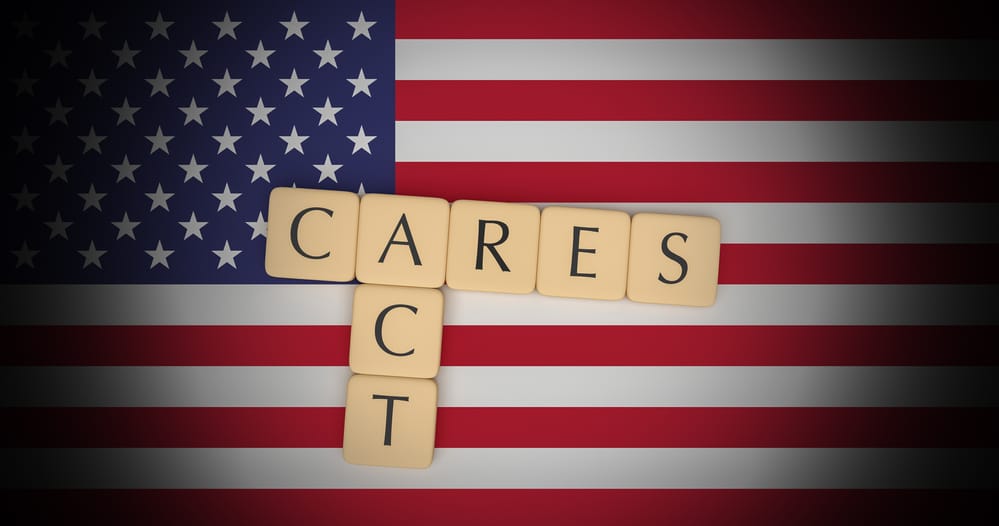
This blog post is written by AACTE consultant Jane West and is intended to provide updated information. The views expressed in this post do not necessarily reflect the views of AACTE.
Implementation of the $2 Trillion CARES Act: Where Do We Stand?
It’s hard to keep track of the swirl of information about federal efforts to address the pandemic in the education space. Here is my best shot at a high-level summary of where things stand:
- It’s been three weeks since the $2 trillion third package of funding (COVID-3 or the CARES Act) became law
- The bill includes the following and distribution to date is as noted:
- $13.5 billion for elementary and secondary education
- No announced process or timeline for distribution yet
- $14.25 billion for higher education
- $6.3 billion is being distributed to IHE’s for students who need emergency financial aid and have expenses related to the pandemic
- $3 billion for a Governor’s Emergency Education Relief Fund
- fund now available for distribution
21 Apr2020
AACTE DEI Video: The Importance of Equitable Disciplinary Actions in Schools
By Jerrica Thurman
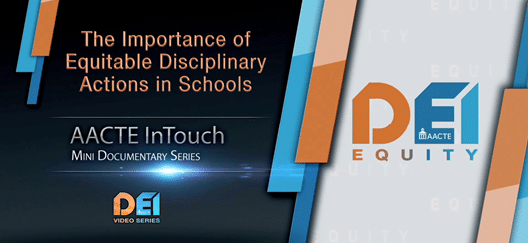
Ed Prep Matters features the “Revolutionizing Education” column to spotlight the many ways AACTE, member institutions, and partners are pioneering leading-edge research, models, strategies and programs that focus on the three core values outlined in the current AACTE strategic plan: Diversity, Equity, and Inclusion; Quality and Impact; and Inquiry and Innovation.
In this segment of the AACTE Diversity, Equity and Inclusion video series, AACTE members promote equitable disciplinary practices for teachers to use as restorative measures to build positive relationships with students. The video segment, The Importance of Equitable Disciplinary Actions in Schools, addresses the importance of eliminating prejudgments so educators can better understand students’ contexts and backgrounds and develop a new lens for addressing disruptive behaviors in schools.
17 Apr2020
By Deborah Koolbeck
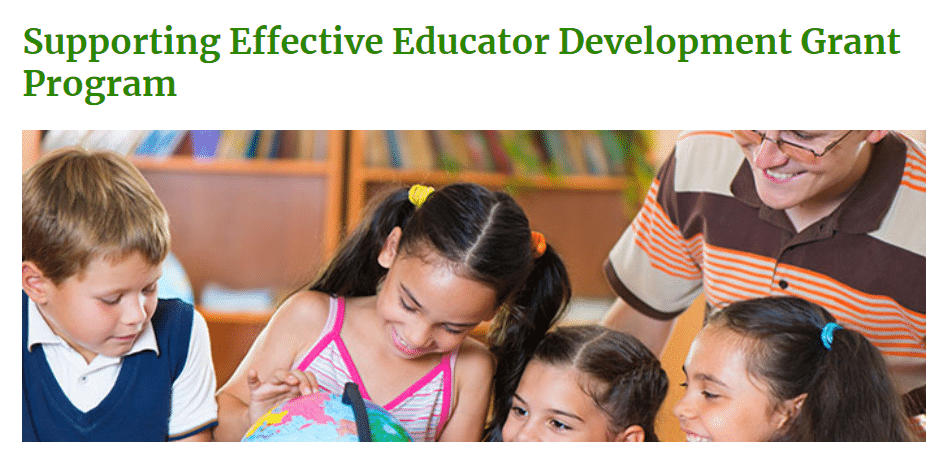
On April 13, 2020, the U.S. Department of Education via the Federal Register announced that applications are available for the FY20 grant cycle of the Supporting Effective Educator Development (SEED) grant program. With the reauthorization of the Elementary and Secondary Education Act, this program was expanded to include institutions of higher education as participants in the program. The Department estimates that $22 million will be available for these 3-year grants.
The SEED grant program’s main goal is to increase the number of highly effective educators by supporting the implementation of evidence-based practices that prepare, develop, or enhance the skills of educators. This program is designed to encourage the use of rigorous evidence in selecting and implementing opportunities to support educator’s development across the continuum of their careers, including preparation, recruitment, evaluation, professional learning, and leadership development.
17 Apr2020
AACTE Responds to COVID-19
By Deborah Koolbeck

The CARES Act, signed into law on March 27, 2020, included nearly $14 billion to support higher education institutions and students. This funding included $6.28 billion to provide cash grants to students for expenses related to disruptions to their education due to COVID-19. The funds move from the U.S. Department of Education to the institutions of higher education, and the institutions disperse the funds to students.
The allocation to each institution is set by a formula established in the CARES Act, weighted by the number of full-time students with Pell grants but also considers the total population of the school and the number of students who were not enrolled full-time in online programs pre-COVID-19. (View the methodology. It is important to note that this initial disbursement is for 50% of what is in the allocation table.) The institution must fill out a Certificate of Agreement with the Department to receive the disbursement via grants.gov. U.S. Secretary of Education Betsy DeVos wrote a letter to college and university presidents sharing guidance on this disbursement.
17 Apr2020
By Ann E. Larson

On behalf of the AACTE Board of Directors, I send greetings and warm wishes for your health and safety during this critical time. As your colleague, I understand your tireless efforts to navigate through the unprecedented challenges the coronavirus has caused for your educator preparation program and university. While we may experience similar struggles, our circumstances may differ because institutions are unique in their own way along with the local communities they serve.
AACTE is currently conducting a survey to better gauge the diverse needs of its member institutions. The survey was distributed to senior leaders with responsibility for a school, college, or department of education such as deans, associate deans, vice presidents, or department chairs. If you have not yet received the AACTE invitation to participate in the survey, it may have landed in your spam folder.
I ask that you take a few minutes to complete the short survey by Friday, April 24. AACTE will use your responses to
- determine the support members need;
- inform the public and policy makers about how the coronavirus is affecting educator preparation; and
- share aggregated information with members to help you benchmark your experience against your peers.

It is imperative that we receive your feedback so we can be better informed about how to assist you and our profession through this difficult time. Thank you in advance for your time and participation in the survey.
My prayers are with each and every one of you.
17 Apr2020
By Detris Adelabu, Michael Dennehy, Jeana Morrison, Shana Rochester and Beth Warren
The road to tenure can comprise unforeseen barriers to success for some underrepresented faculty of color, barriers that often start before pursuit of a tenure-track appointment. Underrepresented faculty describe gaps in mentoring that can begin in graduate school and later impact their opportunity to receive a tenure-track offer as well as their success during the tenure process (Cole, McGowan, & Zerquera, 2017; Garrison-Wade et al., 2012). For those faculty who receive tenure-track appointments, gaps in mentoring can persist during the tenure process. Underrepresented faculty of color discuss not receiving quality support and mentoring from senior faculty during the tenure process. They also discuss feelings of isolation, lack of value for their research, and an expectation to serve as the diversity consciousness of their department. A 2016 report by the TIAA Institute made visible the impact of barriers to tenure among underrepresented faculty of color. The report found relatively small gains in the number of underrepresented faculty of color across a twenty-year period. Gains were mostly attributed to an increase in non-tenure-track appointments.
16 Apr2020
By Maria Salazar and Bryant Jensen
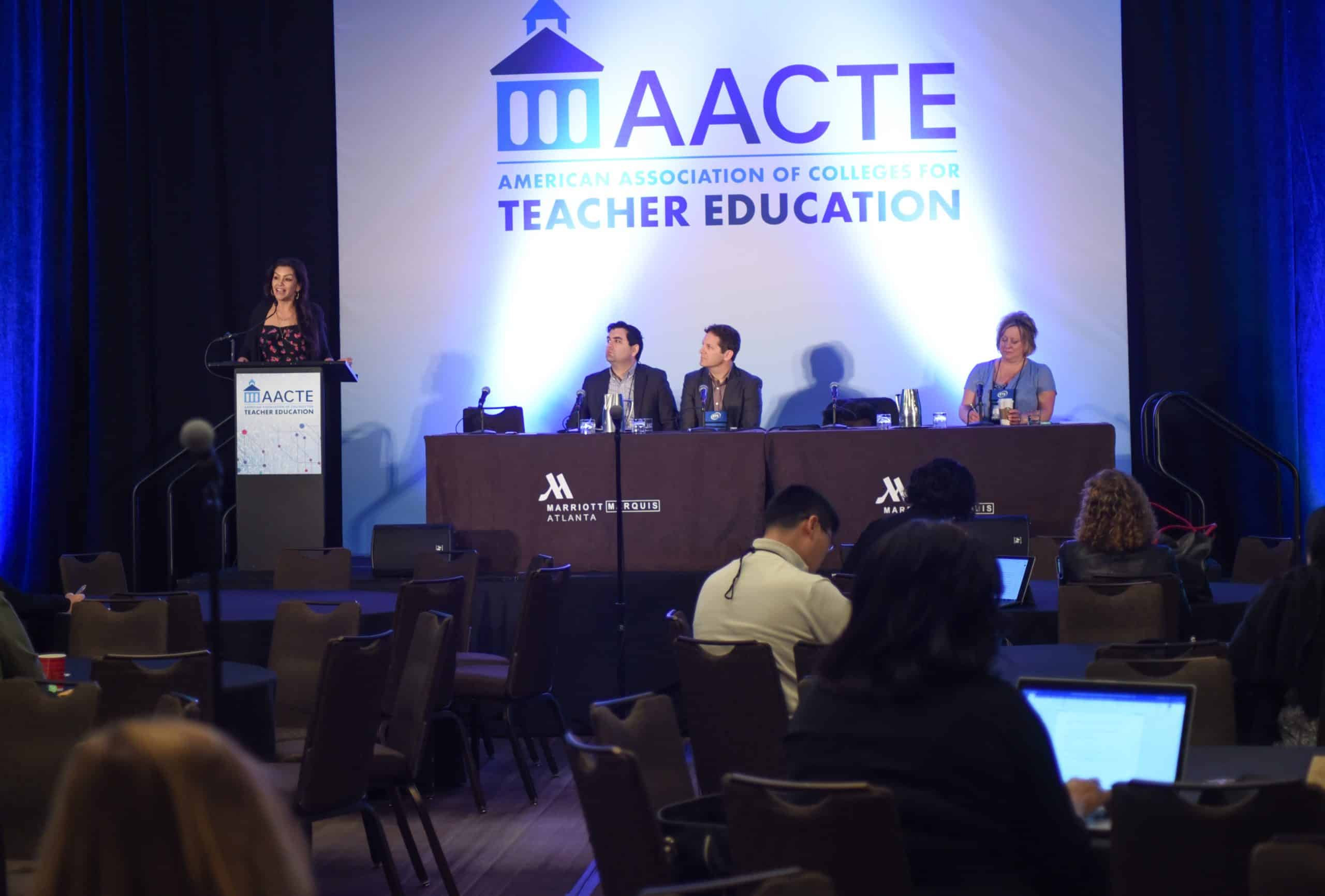
As presenters at the AACTE 2020 Annual Meeting Deeper Dive: Challenges of Immigration and Teacher Education, the authors offer a recap and reflection of the session.
“Quisieron enterrarnos, pero no sabían que éramos semillas” is a Mexican proverb translated as “They wanted to bury us, but they did not know that we were seeds.” This proverb captures the current experience of many immigrants and their children in U.S. society. Immigrants in the United States and around the world are being “buried” under policies and practices that violate their human rights, yet immigrant students and families remain incredibly resilient. Immigrant families draw on sociocultural assets to persevere through setbacks. These conditions have direct implications for teacher education in the U.S. and abroad.
Given the large numbers of immigrants of Latinx descent in the United States, we focus our commentary on Mexican and Mexican American communities. Two-thirds of the U.S. Latinx community is of Mexican origin, and one in seven of all U.S. students in elementary and secondary schools has a Mexican-born parent or grandparent (Jensen & Sawyer, 2013; Passel, 2011). The United States shares many of these immigrant children and youth with its neighbor to the south, México. Indeed, the fastest-growing group of “students we share” between our two countries are U.S.-born students of Mexican heritage living in Mexico and struggling to integrate into Mexican schools (Gándara, 2020).
15 Apr2020
By Carole Basile
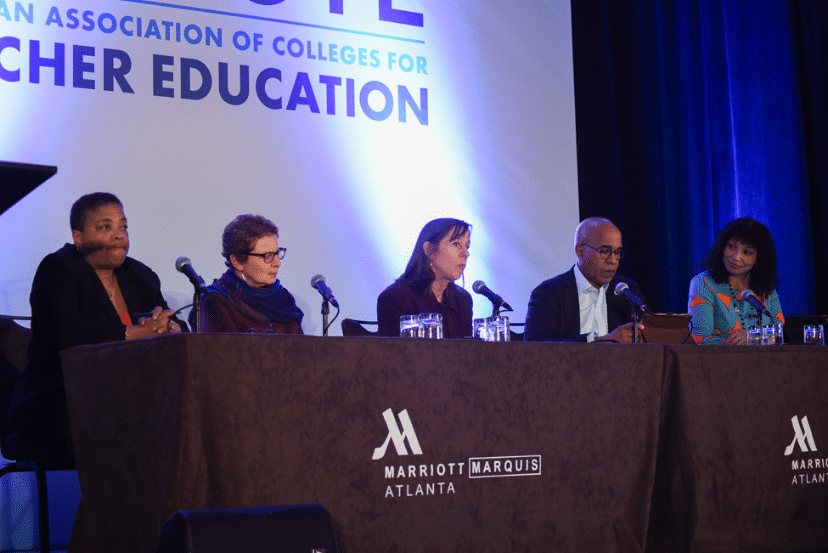
During the AACTE 2020 Annual Meeting in Atlanta, I had the pleasure of serving on the panel of the “Disruptive Deans” Deeper Dive Session along with three fellow deans. Our challenges are disrupting the one-teacher one-classroom model, closing the uneven admissions pathways between community colleges and 4-year institutions, breaking the traditional mindsets of hiring practices, and questioning the biases of traditional learning environments. These are no small tasks.
During the Disruptive Deans Deeper Dive session, the panel covered the following topics:
- “Building the next education workforce”—(I presented this topic.)
- “Designing a clear transfer model in the state of Oregon for community college transfer and increasing the number of teachers of color and bilingual students,” presented by Cecilia Monto, dean, Education and Humanities, Chemeketa Community College.
- “Hiring and retaining faculty of color,” presented by Don Pope-Davis, dean, College of Education and Human Ecology, The Ohio State University
- “Promoting understanding of the social justice imperative of educating teachers to educate all learners including those who are neuro-divergent,” presented by Kimberly White-Smith, dean, LaFetra College of Education, University of La Verne
Our moderator, (also a disruptor) Wanda J. Blanchett, dean, Rutgers University, has led a distinguished career promoting equity and inclusion for all.
15 Apr2020
By Holly Lane
In response to the need to support teachers in their rapid shift to online instruction, the University of Florida Literacy Institute has created online resources to help ease that transition. UFLI realized that they could take their extensive body of research, successful data-driven interventions, and carefully vetted resources, and create virtual versions of the face-to-face work they have always done.
The outcome? Two new online “resource hubs”: one for parents to learn more about how to support their children’s literacy development, and one for teachers to discover effective, easy-to-use methods for providing reading instruction and intervention in an online delivery model.
We developed our Dyslexia Resource Hub in the fall and had plans to create additional resource hubs for parents and for teachers, but this situation gave us the impetus to push fast forward and get it done very quickly. UFLI faculty, staff, and graduate students worked tirelessly to make both hubs launch-ready as school closures made them more necessary than ever.
14 Apr2020
AACTE Responds to COVID-19
By Jerrica Thurman

There is only one day left to register for the AACTE and Old Dominion University co-sponsored webinar featuring education faculty advising world nations on COVID-19, Wednesday, April 15 from 2:00 – 3:00 p.m. The 60-minute webinar is open to all AACTE members.
The webinar, “Uncovering Lessons Learned and Strategies for Higher Education During COVID-19 Pandemic,” will feature President and CEO Lynn M. Gangone in an interview with Helen Crompton, associate professor from the Darden College of Education and Professional Studies at AACTE member institution Old Dominion University in Norfolk, VA. She will address pressing questions such as
- How is education being disrupted globally?
- What are lessons learned from China and other countries about how they are managing the impacts of the coronavirus on education?
- What can universities do to improve the social impact and reduce isolation for college students?
- How can universities advance equitable access to online instruction for disadvantaged students?
- What are best practices for faculty transitioning to teaching online?
- What are recommended education technology tools and other resources to help stay connected with students?
13 Apr2020
AACTE Responds to COVID-19
By Jacqueline Rodriguez
 AACTE is proud to partner with The CEEDAR Center to bring you two 30-minute “lunch and learn” webinars on
AACTE is proud to partner with The CEEDAR Center to bring you two 30-minute “lunch and learn” webinars on
- licensure and certification requirements
- EPP and district partnerships
We know your time is coveted, so these sessions are tailored to focus on strategies and models of best practice to solve immediate challenges.
The first Lunch and Learn will be hosted on April 17 at 1:00 p.m. ET. Registration is open to the public. AACTE, the CEEDAR Center, and partners from the National Association of State Directors of Teacher Education and Certification (NSADTEC) will share national and state-level information and strategies in response to the current demand. Panelists include the following:
09 Apr2020
AACTE Responds to COVID-19
By Lynn M. Gangone

To help AACTE better understand and help members respond to the unprecedented challenges that COVID-19 has created for educator preparation, AACTE distributed a survey today to targeted members. The member survey was sent to senior leaders with responsibility for a school, college, or department of education such as deans, associate deans, vice presidents, or department chairs.
If you received this survey, AACTE needs to hear from you and will use your responses to
- determine the support members need;
- inform the public and policy makers about how the coronavirus is affecting educator preparation; and
- share aggregated information with members to help you benchmark your experience against your peers.
09 Apr2020
By Jacqueline E. King, Ph.D.

Your Association wants you! Are you ready to become a leader in the national educator preparation community, or do you know someone who is? Nominate yourself or a colleague by May 29 to serve on an AACTE standing committee.
AACTE is currently seeking applications from volunteers to serve on the following standing committees:
- Global Diversity
- Government Relations and Advocacy
- Innovation and Technology
- Meetings and Professional Development
- Membership Development and Capacity Building
- Professional Preparation and Accountability
- Research and Dissemination
09 Apr2020
AACTE Responds to COVID-19
By Jerrica Thurman
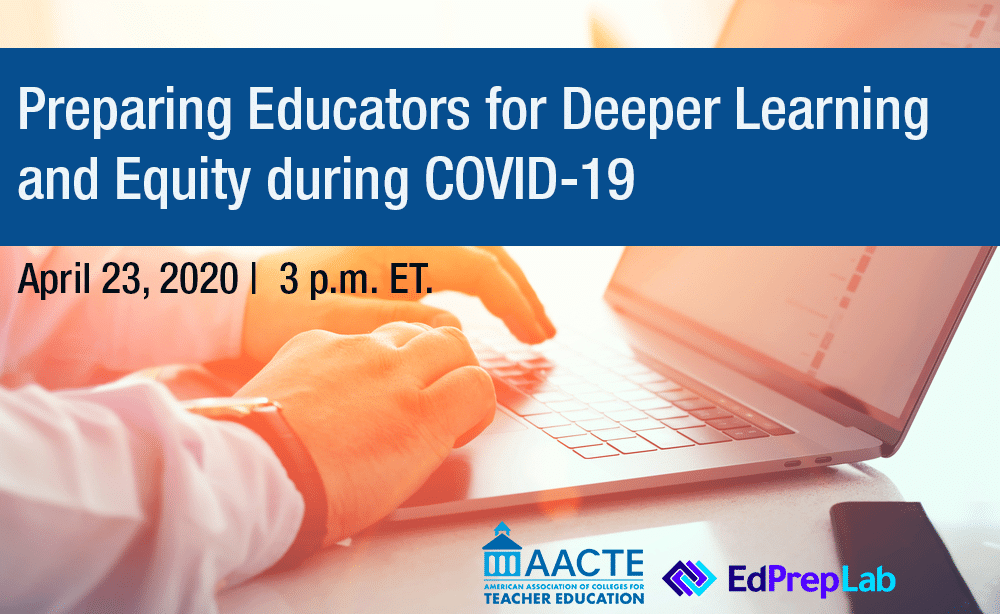
AACTE and the Educator Preparation Laboratory will present, “Preparing Educators for Deeper Learning and Equity during COVID-19,” on Thursday, April 23, 3 – 4 p.m. ET. This webinar features leaders from preparation programs around the country who are members of the Educator Preparation Laboratory network, an initiative of the Learning Policy Institute and Bank Street Graduate School of Education.
As school districts and universities across the nation adapt to distance learning, how are educator preparation programs responding? How are they meeting their candidates’ needs right now? What are they doing to prepare for the future? In this climate of uncertainty, it is more important than ever to ensure teachers and leaders are being prepared to provide deeper learning opportunities to all students, especially those from our most vulnerable populations. During the webinar, the presenters will explore pressing questions around teacher and leader preparation during the COVID-19 crisis, including:
09 Apr2020
By Linda Minor

Applications for the 2021 AACTE awards are now open. For most of the awards, programs and individuals can be either self-nominated or nominated by a third party. To submit your nomination, visit AACTE’s online submission site. Entries for the Outstanding Book Award are due May 15 and entries for the Outstanding Dissertation Award are due August 15. The due date for all other award submissions is October 9.
Winning entries will be decided by the AACTE standing committees and recognized formally at the 2021 Annual Meeting, February 26 – 28, in Seattle, Washington.











 AACTE is proud to partner with The CEEDAR Center to bring you two 30-minute “lunch and learn” webinars on
AACTE is proud to partner with The CEEDAR Center to bring you two 30-minute “lunch and learn” webinars on


